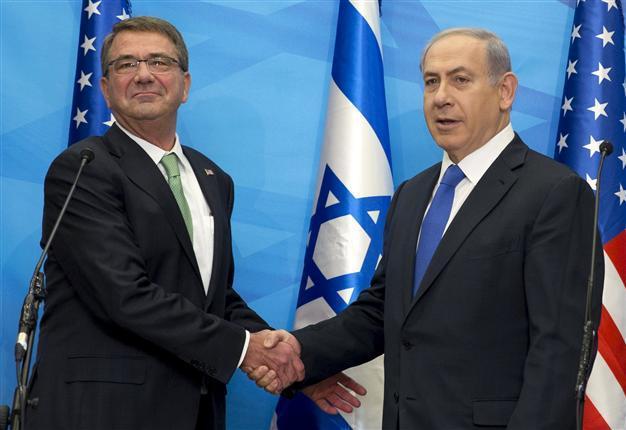Pentagon chief meets Israel PM as Iran deal stokes tension
JERUSALEM - Agence France-Presse

REUTERS photo
US Defence Secretary Ashton Carter met Prime Minister Benjamin Netanyahu July 21 to try to ease tensions over the Iran nuclear deal, as the Israeli leader urged lawmakers in Washington to reject the hard-won agreement.
The two men greeted each other with a long handshake before entering talks that lasted nearly two hours, making no public comment about the tensions over the nuclear accord that Netanyahu has harshly condemned.
Their meeting came on the final day of Carter's visit to Israel, the first stop on a regional tour aimed at reassuring US allies who have concerns over the Iran deal. He is also to travel to Jordan and Saudi Arabia.
On July 21, Carter met Israeli Defence Minister Moshe Yaalon and signalled the United States was ready to boost military cooperation with the Jewish state.
He also toured the country's northern border with Lebanon for an assessment of the threat Israel says Hezbollah poses.
Iran is accused of supporting militants in the region, including Israeli enemies Hezbollah and Hamas, and Israel argues that the expected lifting of sanctions under the nuclear accord will allow it to boost help for such groups.
While some have urged the government to move on and begin adapting to the agreement, Israeli Deputy Foreign Minister Tzipi Hotovely said Tuesday opposition would be maintained in the hope of influencing the US Congress.
US lawmakers have 60 days to review the agreement, though their chances of derailing it are viewed as slim.
"We must not think that our fight is pointless," Hotovely said. "We must continue to influence the Americans and prevent the lifting of sanctions."
Carter sought July 20 to address Israel's worries that the deal with its arch-foe Iran meant Washington was shifting its focus in the region, saying Israel remained "the bedrock of American strategy in the Middle East".
Under the July 14 agreement, Iran agreed to dismantle or mothball much of its nuclear industry in return for an easing and eventual lifting of sanctions.
World powers called it an historic opportunity to set relations with Iran on a new path, but the deal has faced opposition from hardliners both in Tehran and Washington.
On July 21, Iranian Foreign Minister Mohammad Javad Zarif defended the agreement in a speech to parliament in Tehran, saying "we should not forget that any deal is a give and take".
"Each side gives up part of its demands to realise the more important part until what has been given and received is balanced," he said.
Netanyahu argues however that the agreement is not enough to keep the Islamic republic from obtaining nuclear weapons that could be used to target Israel.
He has said military force remains on the table to block Iran's path to a nuclear weapon, although experts say unilateral strikes by Israel appear highly unlikely for now.
Carter noted the deal does not preclude the use of military force to stop Iran from obtaining a nuclear weapon, although the agreement is designed to resolve the issue diplomatically.
Iran insists its nuclear programme is for peaceful purposes.
The US now grants Israel about $3 billion a year in military aid in addition to spending on other projects, such as the Iron Dome missile defence system.
There have been suggestions that assistance could be increased to Israel as well as other countries in the region due to the Iran agreement.
There have been fears by some that such moves could contribute to a new conventional arms race in the Middle East, injecting a fresh supply of weaponry into an already volatile region.
"That has not happened here for at least two decades," said Eytan Gilboa, a political science professor at Bar Ilan University near Tel Aviv.
Netanyahu has urged US lawmakers to reject the deal, including in a series of television interviews with US networks. He angered President Barack Obama by appearing before Congress in March to denounce the emerging accord.
Gilboa said Israel is likely to hold off on discussions of "compensation" in the form of increased military aid until later to avoid signalling to Congress it accepts the agreement.
"Israel wants to show that it is naive to assume that with this agreement you can change the government of Iran," he said.
